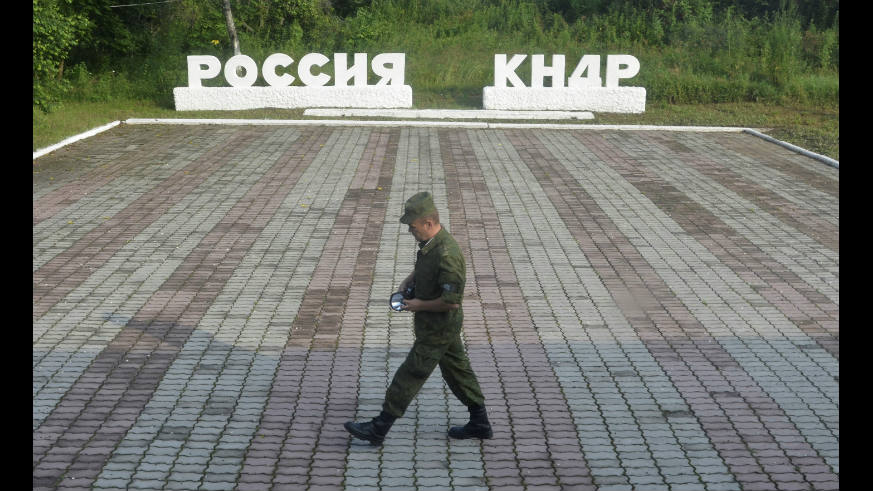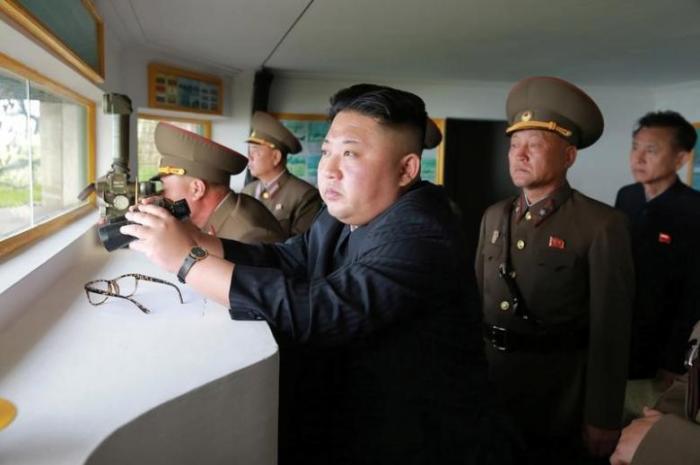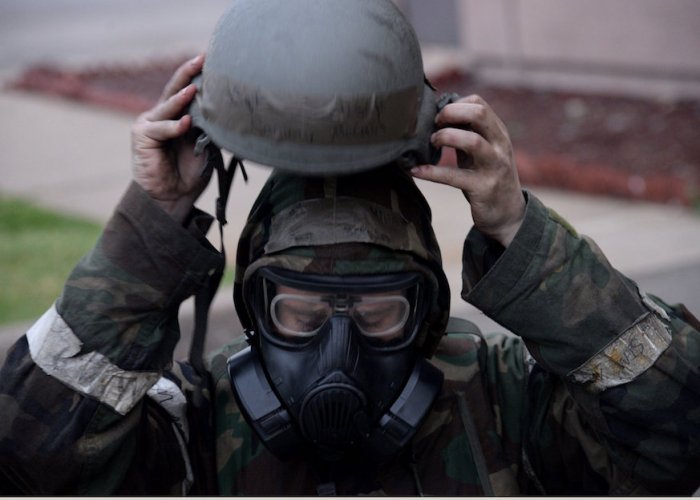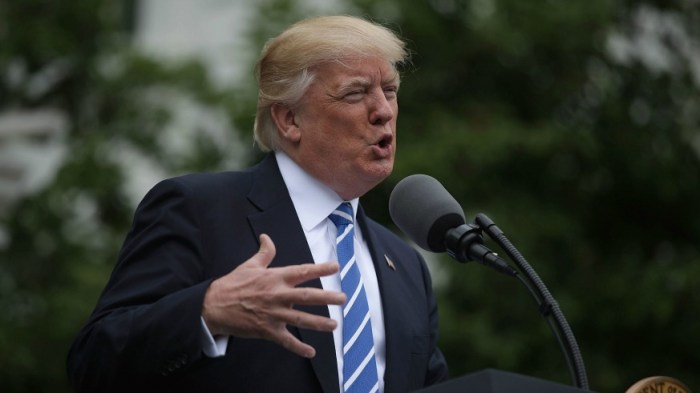First, it was “fire and fury.” Then it was the United States will “totally destroy North Korea.” Is President Trump upping his threats to North Korea, without separating the Kim Jong-un regime from the 25 million citizens of the secretive country, and only making a nuclear attack more likely?
Experts said Trump’s address to the United Nations in which he threatened to “totally destroy North Korea” is only going to taunt Kim and his regime into more missile launches. The government of North Korea tells its people daily that the United States wants to destroy them and Trump’s U.N. speech played right into their fearmongering policies, analysts told The Washington Post.
“President Trump has handed the North Koreans the sound bite of the century,” said Marcus Noland of the Peterson Institute for International Economics and one of the authors of its “North Korea: Witness to Transformation” blog. “That footage will be used time and time and time again on North Korea’s state television channel.”
Trump’s U.N. speech played right into North Korea’s narrative, experts say.
The Korean War, in which the U.S. destroyed 80 percent of the country’s buildings and killed 20 percent of its people, ended in an armistice in 1953 and since, the Kim dynasty has used the image of the United States as an “imperialist aggressor” to control its populace.
North Korea justifies its need for nuclear weapons using the United States and its “hostile policy” to destroy North Korea yet again, according to analysts.
“The Kim regime argues that only it is capable of protecting the country from the existential threat North Korea faces from ‘hostile foreign forces’ led by the United States,” Noland said. “All of the depravity and the denial of rights is all justified by this.”
And Trump’s speech only made matters worse, according to experts.
The??has great strength & patience, but if it is forced to defend itself or its allies, we will have no choice but to totally destroy #NoKo. pic.twitter.com/P4vAanXvgm
— Donald J. Trump (@realDonaldTrump) September 19, 2017
“This will reinforce the leadership’s position that the United States is hostile to North Korea,” said Jung H. Pak, chair of Korea studies at the Brookings Institution. “This is exactly what North Korea is talking about, and [Trump] said it right there on TV in front of the whole world.”
Trump shoots off his “rocket mouth” about “rocket man” Kim Jong-un
The “rocket man” nickname and other taunts will cause representatives in North Korea to jump to defend their leader, Robert Carlin, a former CIA analyst on North Korea, told The Post.
“This slander against the supreme leader in front of an international audience . . . is going to cause the Foreign Ministry to have to leap to the defense of Kim, whether or not Kim orders it,” Carlin said.
I spoke with President Moon of South Korea last night. Asked him how Rocket Man is doing. Long gas lines forming in North Korea. Too bad!
— Donald J. Trump (@realDonaldTrump) September 17, 2017
There is the chance that North Korea will just wait out the Trump administration, since U.S. leadership changes every four to eight years, but the fiery rhetoric “could give Pyongyang an excuse or incentive to redouble its nuclear and missile development, which means more testing,” Duyeon Kim, visiting senior fellow at Korean Peninsula Future Forum in Seoul, explained.
“Pyongyang might interpret his bluster as credible and work harder on its nuclear weapons,” she continued. “Or, Pyongyang might laugh and not take his warnings seriously, which is also a big problem, too. We just don’t know for sure.”
Trump’s speech was met with mixed feelings by other members of the intergovernmental organization.
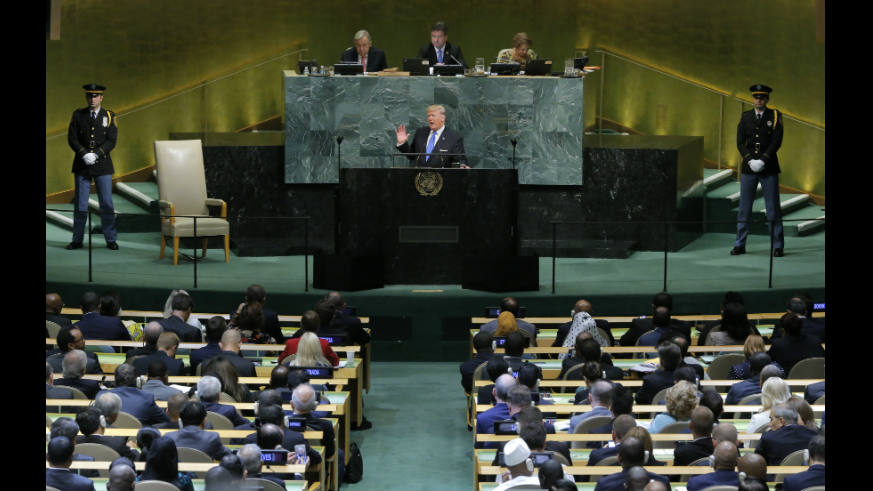
China calls Trump’s “political chest-thumping… unhelpful.”
Beijing blames North Korea for the escalating hostility but also the United States for backing the regime into a corner.
“Trump threatens DPRK with ‘total destruction’, while China calls for peaceful settlement,” the online English-language edition of the People’s Daily newspaper headlined an op-ed. DPRK stands for the Democratic People’s Republic of Korea, the country’s official name.
“Trump’s political chest-thumping is unhelpful, and it will only push the DPRK to pursue even riskier policies, because the survival of the regime is at stake,” it wrote.
China’s Foreign Ministry spokesman Lu Kang diplomatically agreed saying the conflict should be solved through “political and diplomatic means,” The Washington Post reported.
“The Peninsula situation is still in a complex and sensitive state,” he said. “We hope that relevant parties could maintain restraint while completing United Nations Security Council resolutions, and take more correct actions which are helpful in easing the situation.”
Russia is “concerned” by Trump’s comments on North Korea and Iran and suspects the U.S. is violating an arms treaty.
Russia is “extremely concerned” by Trump’s comments, Foreign Minister Sergei Lavrov said.
“If you simply condemn and threaten, then we’re going to antagonize countries over whom we want to exert influence,” said Lavrov, referring to Trump’s comments on North Korea.
He saved some of his harshest criticism however for what he said was a possible violation by the United States of a landmark 1987 arms control treaty which bans Russian and American intermediate-range missiles on land.
“We have suspicions on at least three fronts that the Americans are creating weapons systems which violate or could violate the treaty obligations,” said Lavrov, who said Moscow had relayed its concerns to the United States.
We will defend our people, our nations and our civilization from all who dare to threaten our way of life…cont: https://t.co/SYBRshx89b pic.twitter.com/sIiAuxL3OE
— Donald J. Trump (@realDonaldTrump) September 15, 2017
South Korea says denuclearization of North Korea “is the only way to the future.”
“We view the speech as portraying a firm and specific stance on the key issues regarding keeping peace and safety that the international community and the United Nations are faced with,” the office of South Korean President Moon Jae-in said in a statement on Wednesday.
“It clearly showed how seriously the United States government views North Korea’s nuclear program as the president spent an unusual amount of time discussing the issue,” the presidential Blue House’s statement said.
Trump’s speech “reaffirmed that North Korea should be made to realize denuclearization is the only way to the future through utmost sanctions and pressure,” it said.
Japan agrees the “time for dialogue” has passed.
“Now is not the time for dialogue. Now is the time to apply pressure,” Japanese Prime Minister Shinzo Abe told a gathering of investors at the New York Stock Exchange, ahead of a scheduled address at the annual United Nations General Assembly on Wednesday.
“We can’t be satisfied that the U.N. has approved new sanctions against North Korea,” Abe said. “What’s crucial now is to put sanctions into effect without lapses and that requires close cooperation with China and Russia.”
On Sept. 11, the U.N. Security Council unanimously stepped up sanctions against North Korea over its sixth and most powerful nuclear test, imposing a ban on the isolated nation’s textile exports and capping imports of crude oil.
North Korea fired a missile on Friday that flew over Hokkaido in northern Japan and landed far out into the Pacific Ocean, according to Japanese and South Korean officials, further ratcheting up tensions in the region.
Abe said diplomatic attempts to get North Korea to abandon its nuclear aspirations have failed over two decades.
“Dialogue for the purpose of having dialogue is meaningless,” Abe said at the New York Stock Exchange.
Reuters contributed to this report.

